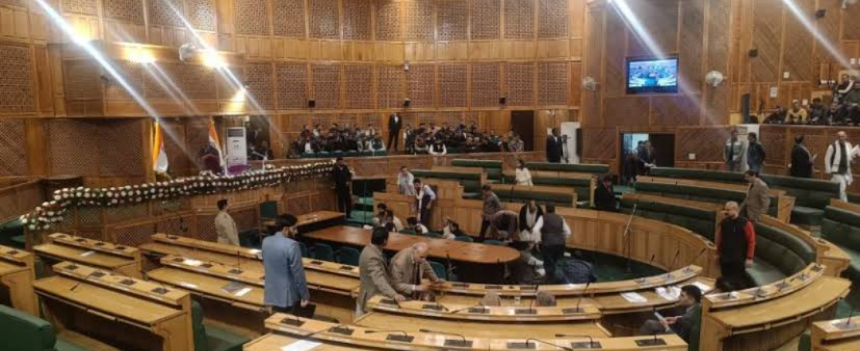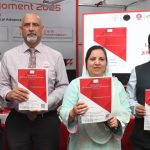In any democratic society, elected representatives are entrusted with the solemn duty of advocating for the public’s welfare, upholding the principles of democracy, and working toward the development of their respective regions. Voters look to these leaders to address pressing issues, make responsible policy decisions, and engage in constructive debates that shape the future. Yet, it is deeply disappointing when lawmakers instead engage in physical altercations in legislative assemblies, reducing these hallowed institutions to arenas of dishonor rather than sites of reasoned debate and decision-making.
Instances of such conduct are not just isolated incidents; they represent a broader failure to respect the principles that underpin representative democracy. Elected members in Jammu and Kashmir (J&K), including from the Jammu and Kashmir National Conference, Bharatiya Janata Party (BJP), Jammu & Kashmir People’s Democratic Party (PDP), and the People’s Conference, have unfortunately fallen into this pattern. Their actions not only damage the credibility of these parties but also insult the trust that voters have placed in them. This behavior shows a complete disregard for the responsibilities of office and a failure to acknowledge the struggles and aspirations of the public, casting a shadow over the very significance of elections.
The Betrayal of Public Expectations
The people of J&K, like voters everywhere, cast their ballots with the hope of achieving progress and stability. They expected an elected government to respond swiftly and responsibly to their issues. Yet, instead of seeing prompt solutions and effective governance, they now witness representatives bickering and fighting, often for personal or partisan gains rather than the welfare of the public. When elected members prioritize infighting over addressing the region’s developmental needs, they betray the expectations of the very people they were elected to serve.
In J&K, an additional layer of frustration emerges from the absence of an elected government for prolonged periods, which has intensified people’s yearning for accountability, governance, and progress. During the gap in elected leadership, people faced countless hardships, from poor infrastructure to economic stagnation, hoping that a new government would address these issues once the elections were completed. Yet, the conduct of some members in the Assembly has left many questioning if they would have been better off without an elected government at all.
Wasted Resources and Delayed Development
The Model Code of Conduct (MCC), which comes into effect during elections, often halts or delays ongoing development projects and restricts government departments from launching new initiatives. While this code is essential to ensure free and fair elections, it also means that crucial developmental activities in J&K, including infrastructure projects, healthcare, and public welfare initiatives, were temporarily suspended. People accepted these delays with the expectation that an elected government would compensate for the time lost by expediting projects and tackling issues efficiently once in office.
However, the regrettable behavior of some elected representatives has only deepened public dissatisfaction. Instead of pushing for the swift completion of projects and delivering on campaign promises, these representatives have been preoccupied with intra-Assembly conflicts and politically motivated squabbles. This diversion of focus and energy from constructive governance to personal feuds leads to further delays in development and stagnates progress in J&K. Valuable public resources spent on the electoral process now appear squandered as many citizens feel disillusioned, wondering if these elected leaders genuinely care about the hardships they endure daily.
Erosion of Democratic Values and Public Trust
For a democracy to thrive, it must be grounded in principles of accountability, transparency, and constructive discourse. Lawmakers are expected to set an example for the public, exhibiting restraint, dignity, and a commitment to rational debate. Unfortunately, when representatives engage in dishonorable conduct, they erode these foundational values. Assembly floors, which should echo with meaningful debates and visionary ideas, have instead become stages for embarrassing confrontations, thus degrading public trust in democratic institutions.
The behavior of some elected officials has also created an environment where citizens feel increasingly disconnected from those in power. For a region like J&K, where political complexities require delicate handling and understanding of local needs, such behavior by elected representatives becomes even more damaging. The loss of faith in elected institutions hampers public participation and discourages constructive civic engagement, resulting in a society that feels disengaged and disempowered.
Regretting the Choice: Public Disillusionment
There is a growing sentiment among the people of J&K that they may have been better off without an elected government if this is the conduct it brings to the Assembly. The frustrations of daily life, compounded by the inefficacies of elected leaders, have led many to question their decision to vote. This disillusionment is a serious problem, as it can deter voter turnout in future elections and erode the democratic foundation of the region.
When voters elect representatives, they do so in the hope of progress, stability, and the redressal of grievances. The current disappointment over the lack of responsible governance may even affect future participation, as many might conclude that their votes lead to little positive change. This creates a dangerous cycle, as fewer people participating in elections can lead to less representative governance, weakening the region’s political stability even further.
The Path Forward: Restoring Decorum and Commitment
The responsibility for improving the situation in J&K’s legislative institutions lies squarely on the shoulders of its elected representatives. There is an urgent need for introspection among the MLAs and political leaders to reconsider their roles as public servants. They must recognize that voters place their trust in them not for personal disputes but for service and governance.
- Fostering a Culture of Respect and Debate: A constructive Assembly session should be one where representatives can engage in meaningful debate, respect differing opinions, and prioritize the public’s concerns. Lawmakers should look to examples of parliamentary behavior worldwide, where debates are rigorous but rarely descend into physical altercations. Encouraging such a culture will help restore faith in the Assembly as a place of progress and problem-solving.
- Establishing Strong Ethical Standards: Legislatures must adopt and strictly enforce ethical codes of conduct that prohibit disruptive and disrespectful behavior. Violators should be held accountable, with penalties ranging from temporary suspension to more serious repercussions for repeated offenses. Instituting such standards could prevent many of the embarrassing incidents that erode public trust in government.
- Prioritizing Development and Accountability: The elected government must set aside political differences and focus on long-pending developmental goals. Streamlining processes and providing accountability mechanisms will ensure that projects delayed by the MCC or other factors are resumed promptly. Lawmakers need to show the public that they are committed to making real progress on the issues that affect their daily lives.
- Educating Representatives on Public Expectations: In a democracy, public service is a privilege and a responsibility. Training programs on democratic principles, public expectations, and governance may help remind elected officials of their roles as servants of the people. This could be particularly valuable for new members who may lack experience in legislative proceedings and the decorum expected within Assembly walls.
- Encouraging Public Engagement: To bridge the gap between the public and their representatives, assemblies could hold more open forums, where elected members are encouraged to interact with constituents outside of election periods. This could build a culture of accountability, making representatives more responsive to public needs and less likely to act irresponsibly when in office.
Conclusion
The disgraceful conduct of some elected representatives in J&K’s Assembly is a harsh reminder of the challenges facing democracy. The onus is now on political leaders to demonstrate integrity, foster a culture of respect, and engage meaningfully in resolving the region’s issues. They must act in a manner that reflects the values of democracy, allowing them to truly serve the public’s interests.
The people of J&K deserve representatives who prioritize progress and development, not personal disputes. It is essential for these elected leaders to rise above petty conflicts and reaffirm their commitment to the public trust. Only then can the true spirit of democracy be restored, and only then will the people feel that their votes have been cast in the pursuit of a better, more prosperous future.
(Author is a Political Analyst and National TV debater. The ideas expressed are his own and can be reached on @[email protected])








